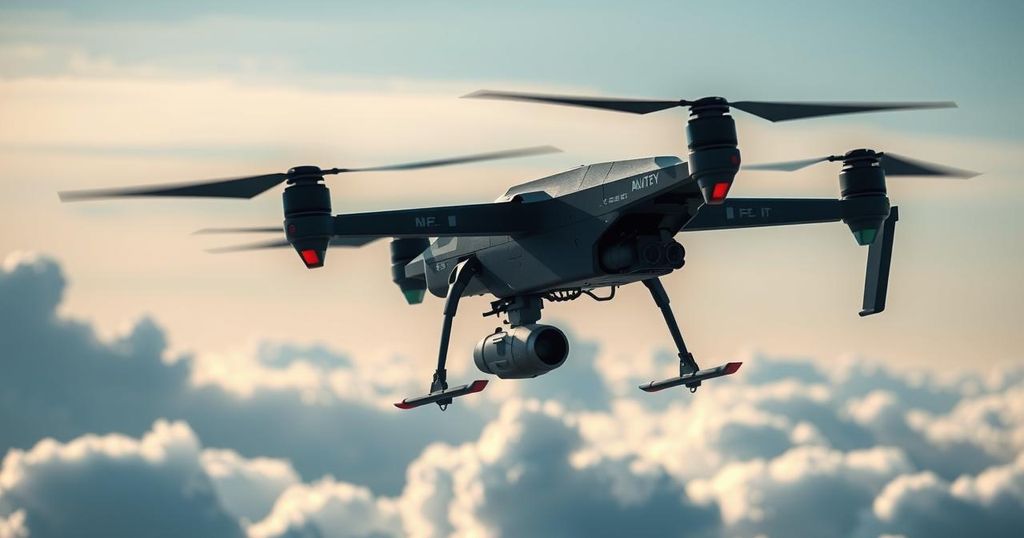Kurdish Official Denies Drone Claims, Critiques Turkish Propaganda

A Kurdish military official refuted claims of acquiring drones from Iran, labeling them Turkish propaganda. Emphasizing that their drone capabilities are developed in-house, he denounced media distortion aimed at harming their image. The historical enmity between Kurds and Turkey complicates the Kurdish struggle for autonomy, as Turkish forces persistently target Kurdish regions, while Kurdish representatives express hopes for international support against both Turkish and extremist threats.
A Kurdish military official emphatically denied allegations that forces acquired drones from Iran, asserting that such claims are merely Turkish propaganda. In a conversation with The Jerusalem Post, the official explained that their drone capabilities are limited and developed internally by their fighters, dismissing accusations from the Turkish outlet Yeni Safak as a deliberate distortion of their image. He contended that these claims stem from the Turkish government’s failure to make progress against Kurdish fighters.
The Kurdish representative described the current status of the Kurdish-administered regions in Syria, stating that their forces control approximately 30-35% of the area, which he labeled the safest in the country. He pointed out that their autonomous existence directly opposes Turkish President Erdogan’s ambitions to assert control over these territories, revitalizing past Ottoman conquests. Despite ongoing attacks, the Kurdish forces have maintained their territorial integrity, challenging Turkey’s narrative through media warfare.
Moreover, the Kurdish-led Syrian Democratic Forces (SDF) publicly condemned Yeni Safak’s accusations, reiterating their ability to independently develop drone capabilities. The spokesperson emphasized that the claims by the Turkish media are fabricated and serve to incite animosity toward Kurdish forces. He underscored the challenges faced by Kurdish populations in Syria, caught between Turkish aggression and the domination of extremist factions within the region.
Historical tensions between Turkey and the Kurdish minorities are rooted in ethnic strife and the fight for independence. The Kurdish community constitutes a significant percentage of Turkey’s population, yet many have faced violence and displacement. Turkey’s military offensives have aimed to suppress Kurdish influence, labeling them as terrorists, exacerbating an already complicated dynamic in Syrian territory.
The interviewee expressed profound concerns about the shifting political landscape in Syria, particularly regarding Turkey’s increasing influence amid the Assad regime’s decline. He pointed out the ongoing threats to Kurds, noting that both Turkey and Iran pose similar dangers to their existence. Unfortunately, he reiterated that the Turkish government has historically resorted to ethnic cleansing as a means of consolidating control over Kurdish regions.
While acknowledging the international community’s efforts toward creating a balanced and fair Syria, the official expressed skepticism about the current government’s capacity for fostering stability. The complexities of the Syrian crisis suggest that extremist groups, including ISIS, may rise again, posing additional challenges for the diverse ethnic and religious communities.
Concerning relations with Israel, the Kurdish official remarked on the historical connection and potential for cooperation aimed at regional stability. Despite the challenges of current political climates, he expressed hope that Israel, endowed with remarkable capabilities, could assist in combating terror and fostering lasting peace. He affirmed the importance of active collaboration among nations to ensure security and stability in the region.
The relationship between the Kurdish minority and the Turkish government has been strained due to longstanding ethnic tensions and disputes concerning Kurdish independence. The Kurds constitute approximately 15-20% of the Turkish population, with large communities also existing in parts of Syria, Iraq, and Iran. In recent years, Turkey has conducted military operations against Kurdish forces, labeling them as terrorist affiliates, complicating the geopolitical situation in the region.
In conclusion, the Kurdish military official’s statements underscore the ongoing complexities and challenges faced by Kurdish forces amid persistent threats from Turkey. Dismissing claims of Iranian drone acquisition as propaganda, he emphasizes the need for recognition of their autonomous efforts in developing military capabilities. The historical enmity between Turkey and the Kurds continues to shape the current dynamics in the region, heightening the need for foreign support and cooperation.
Original Source: www.jpost.com








